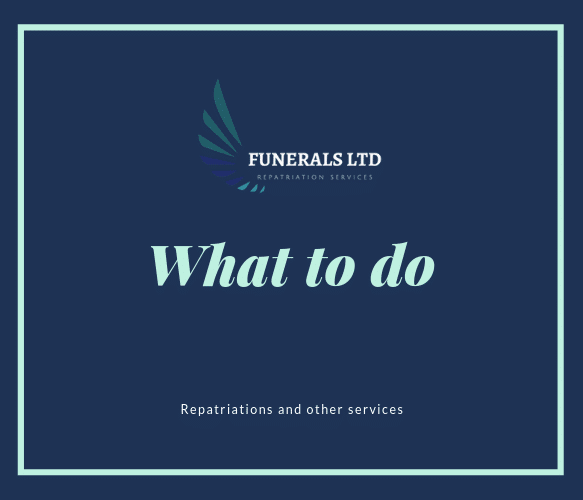What to do when Death Occurs
The Registration Of The Death
is the formal record of the death. It is done by the Registrar of Births, Deaths and Marriages and you will find the address of the nearest register office in the telephone directory. When someone dies at home, the death should be registered at the register office for the district where they lived. If the death took place in hospital or in a nursing home it must be registered at the register office for the district in which the hospital or home is situated. In England and Wales, if it is convenient, you can go to a different office to register the death and the details will be passed on to the correct office. You should check the opening hours of the office you wish to go to. Some offices have an appointments system.
A death should be registered within five days but registration can be delayed for another nine days if the registrar is told that a medical certificate has been issued. If the death has been reported to the coroner you cannot register it until the coroner’s investigations are finished.
It is a criminal offence not to register a death.
- The death should be registered by one of the following (in order of priority):
- a relative who was present at the death
- a relative present during the person’s last illness
- a relative living in the district where the death took place
- anyone else present at the death
- an owner or occupier of the building where the death took place and who was aware of the death
- the person arranging the funeral (but not the funeral director).
You cannot delegate responsibility for registering the death to anyone else.
You must take with you the medical certificate of death, since the death cannot be registered until the registrar has seen this. If possible, you should also take the person’s NHS medical card and birth and marriage certificates. The registrar will want from you the following information:-
- date and place of death
- the full name of the person (including maiden name) and their last address
- the person’s date and place of birth
- the person’s job
- the full name, date of birth and job of a living or dead spouse or civil partner
- if the person was still married, the date of birth of their husband or wife
- whether the person was receiving a pension or other social security benefits.
Forms you’ll be given
- When you have registered the death, the registrar will give you a green certificate (for which there is no charge) to give to the funeral director. This allows either burial or cremation to go ahead. Occasionally a registrar may be able to issue a certificate for burial only (but never cremation) where no one has yet been able to register the death.
- The registrar will also give you a form to send to the Department for Work and Pensions (DWP) (In Northern Ireland the Social Security Agency). This allows them to deal with the person’s pension and other benefits.
- Death certificate
The death certificate is a copy of the entry made by the registrar in the death register. This certificate is needed to deal with money or property left by the person who has died, including dealing with the will. You may need several copies of the certificate, for which there will be a charge.
You can get copies of a death certificate from the General Register Office. Its contact details are on the GOV.UK website at www.gov.uk.
In Northern Ireland details of District Registrars can be found on nidirect’s website at www.nidirect.gov.uk.
When a coroner is needed
Anyone who is unhappy about the cause of a death can inform a coroner about it, but in most cases a death will be reported to a coroner by a doctor or the police. A coroner is a doctor or lawyer appointed by a local authority to investigate certain deaths. In Northern Ireland, the Lord Chancellor appoints a coroner. They’re completely independent of the authority and has a separate office and staff. You will find the address of your local coroner’s office in the telephone directory.
A coroner can investigate a death if the body is in their district, even though the death took place somewhere else, for example, abroad.
A death must always be reported to a coroner in the following situations:
- the person’s doctor had not seen them in the 14 days before they died or immediately afterwards (28 days in Northern Ireland)
- a doctor had not looked after, seen or treated the person during their last illness (in other words, death was sudden)
- the cause of death is unknown or uncertain
- the death was violent or unnatural (for example, suicide, accident or drug or alcohol overdose)
- the death was in any way suspicious
- the death took place during surgery or recovery from an anaesthetic
- the death took place in prison or police custody
- the death was caused by an industrial disease.
In some cases the coroner will need to order a post-mortem, in which case the body will be taken to hospital for this to be carried out. You do not have the right to object to a post-mortem ordered by the coroner, but should tell the coroner if you have religious or other strong objections. In cases where a death is reported to a coroner because the person had not seen a doctor in the previous 14 days (28 in Northern Ireland) the coroner will consult with the person’s GP and will usually not need to order a post-mortem.
For more information about post-mortems and your rights to know what happens with organs and tissue, go to the Human Tissue Authority website at www.hta.gov.uk.
A death reported to a coroner cannot be registered until the coroner’s investigations are complete and a certificate has been issued allowing registration to take place. This means that the funeral will usually also be delayed. Where a post-mortem has taken place the coroner must give permission for cremation.
Inquests
An inquest is a legal inquiry into a death. Only a coroner can order an inquest and relatives have no right to insist on one.It is held in public (sometimes with a jury) by a coroner where the death was violent or unnatural or took place in prison or police custody or where the cause of death is still uncertain after a post-mortem or, in Northern Ireland, where a child has died in care.
An inquest may take place into a death which took place abroad if the body has been returned to the UK. Relatives may attend an inquest and ask questions of witnesses. In England and Wales legal aid may be available for legal advice on inquests. In Northern Ireland legal aid is not available for inquests but some pre-inquest advice may be available under the green form scheme. In England and Wales, an organisation called INQUEST may sometimes be able to arrange legal representation, either free or for a reduced charge. The address of INQUEST is:
89-93 Fonthill Road
London N4 3JH
Tel: 020 7263 1111
Fax: 020 7561 0799
Email: [email protected]
Website: www.inquest.org.uk
Facebook: www.facebook.com/inquestUK
Twitter: www.twitter.com/inquest_org
The inquest should provide more information about how and why the death took place and whether anyone else was responsible. In some cases, a criminal prosecution may later take place.
Once the inquest has been held the death can be registered and the funeral can take place (although in some cases the coroner may allow the funeral to go ahead before the inquest is over).
Contact us now at [email protected] for more information.


0 Comments